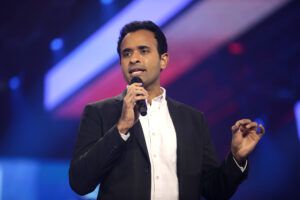Strive Asset Management co-founder Vivek Ramaswamy is taking his “anti-woke” message to the next level by campaigning to be nominated as the Republican candidate for president of the United States in 2024.
Ramaswamy made his official announcement on Tuesday evening on Fox News, and detailed his plans in a Wednesday opinion piece in the Wall Street Journal entitled Why I’m Running for President.
Ramaswamy was not available for comment ESG Clarity‘s sister title Investment News put in a request, but Strive co-founder and president Anson Frericks confirmed that Ramaswamy has resigned from his role as chairman of Strive, a $650m asset management firm.
Strive, which was founded a year ago in Columbus, Ohio, has launched eight exchange-traded funds and has three more in filings, all of which directly or indirectly shun the trend toward ESG and sustainable investing trends as a means of building investment portfolios.
“We ask companies to focus unapologetically on the mission of building shareholder value,” Frericks said. “We want to depoliticize corporate America.”
Frericks, who has known Ramaswamy for 20 years, said the presidential campaign is completely separate from the asset management business.
But it would be impossible not to notice a common theme.
Frericks described the ESG movement as “starting to impact democracy,” adding that “companies are using capital positions to have political influence.”
Specifically, he cited BlackRock chief executive Larry Fink, who has pressured public companies to fall in line with a variety of ESG and sustainability mandates.
“We think people like Larry Fink and [JPMorgan CEO] Jamie Dimon, if they want to impart their views from bully pulpits, should step down and run for office,” Frericks said.
Strive not only doesn’t tout its asset management as anti-ESG, but its founders resist the tagline as missing the point.
Last summer when discussing the flagship Strive US Energy ETF (DRLL), Matt Cole, head of Strive’s product and investing, said debuting with a straightforward, passive energy-sector strategy was designed to “unlock shareholder value through shareholder advocacy, voice and votes.”
“We see what’s happening in the industry through ESG-friendly asset managers,” he added.
Cole cited a 2021 Chevron shareholder vote as an example of the way the largest ETF providers can influence corporate actions. The shareholder resolution required Chevron to monitor and reduce the carbon footprint of every company in its supply chain.
Though Chevron’s board of directors described the proposal as overly burdensome and didn’t support the proposal, it passed after all the major ETF providers managing funds that include shares of Chevron stock voted in favor.
“We say US energy companies should evaluate all future and current investments as well as alternative energy projects exclusively based on a financially measurable return on investment, regardless of any other social, political, cultural or environmental goals,” Cole said. “They might be noble and important conversations, but the right place is through the political process, where everybody has one vote.”
Ramaswamy, who has become a regular contributor to the Wall Street Journal’s opinion pages, described his campaign as an alternative to Republican slogans “they memorized in 1980.”
“I am launching not only a political campaign but a cultural movement to create a new American dream, one that is not only about money but about the unapologetic pursuit of excellence,” he wrote.
The son of immigrants, Ramaswamy lists securing the Mexican border among his priorities for the country, which include eliminating racial preferences for college admission, reducing the power of unelected bureaucrats, reclaiming global energy leadership and “publicly exposing every known instance in which bureaucrats have wrongfully pressured companies to take constitutionally prohibited actions.”
“As Elon Musk did at Twitter, I will release state action files from the federal government,” Ramaswamy wrote.
Anyone paying attention to Ramaswamy’s work should not be surprised by his campaign platform. His most recent published books include Nation of Victims: Identity Politics, the Death of Merit and the Path Back to Excellence and Woke, Inc.: Inside Corporate America’s Social Justice Scam.
Frericks said Strive has grown to 40 employees, including several people qualified to represent the asset manager’s message in Ramaswamy’s absence.
“Until now, one person has been the face of the business, and one person was building the business, but I will be taking more of a forward role at Strive,” he said. “It’s an opportunity for everybody at Strive to step up and play a bigger role.”
Regardless of how far Ramaswamy’s political campaign goes, it’s already being spun as a win by one of his biggest targets.
“I think his involvement in the race will keep the ESG conversation in the presidential discussion and ironically that might be a good opportunity for more people to understand the opportunities that exist,” said Bryan McGannon, managing director at The Forum for Sustainable and Responsible Investment.
“We have been clear all along that those taking an anti-ESG view are misinformed,” McGannon said. “That’s true whether someone is running for office or not.”
This article first appeared on ESG Clarity US sister publication InvestmentNews.
Photo creit: Gage Skidmore from Surprise, AZ, United States of America is licensed under CC BY-SA 2.0.
